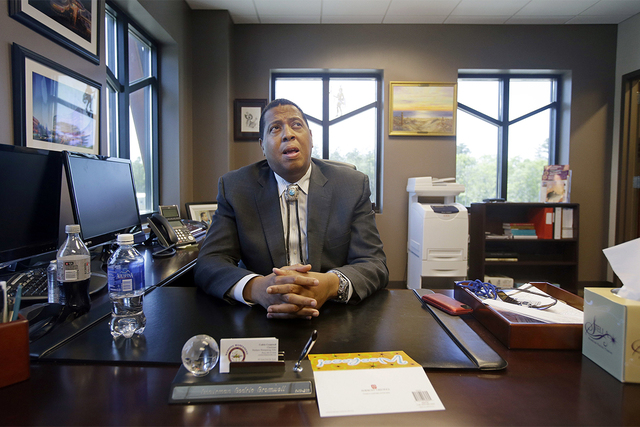Native Americans hoping Trump’s ‘America first’ helps first Americans

BOSTON — Native Americans hope President Donald Trump doesn’t forget America’s first inhabitants as he promises to put “America first.”
Tribes have been reaching out to the Republican administration since it took office last month, saying they’re ready to help it meet its campaign promises of improving the economy and creating more jobs for Americans.
Five large tribes in Oklahoma — the Cherokee, Chickasaw , Choctaw, Muscogee Creek and Seminoles — have requested a meeting with the New York billionaire during his first 100 days in office so they can talk about ways to advance their common interests.
In Massachusetts, leaders of the Mashpee Wampanoag tribe, descendants of the Native Americans who first encountered the Pilgrims nearly four centuries ago, have been echoing similar sentiments to Trump officials as they seek approval of reservation lands to build a $1 billion resort casino south of Boston.
“Tribes are pouring billions and billions of dollars into the U.S. to help make America great again,” said Cedric Cromwell, chairman of the 2,600-member, federally recognized tribe, playing off Trump’s campaign slogan. “All of these economies we’re creating, from resort casinos to malls to businesses. We’re job creators. That’s a story that’s never really told.”
But tribes elsewhere have already steeled for battle just weeks into the new administration.
The Standing Rock Sioux tribe in North Dakota has asked the courts to overturn recent federal approvals for the Dakota Access pipeline. The tribe and its supporters are also planning a large demonstration in Washington on March 10.
“The Trump Administration is circumventing the law: wholly disregarding the treaty rights of the Standing Rock Sioux,” Jan Hasselman, an attorney representing the tribe, said in a statement. “It isn’t the 1800s anymore — the U.S. government must keep its promises.”
The tribes along the nation’s border with Mexico have also voiced concerns about the impact Trump’s proposed wall will have on their sovereign lands. And other tribal advocates are closely watching what comes of Republicans’ promises to repeal and replace former President Barack Obama’s Affordable Care Act.
The law included federal funds for tribal health care programs, and stripping them could have “disastrous consequences,” dozens of tribal groups wrote in a December letter to congressional leaders.
Despite the uncertainties, many tribal leaders say they’re still hopeful they can build on the strong relationships enjoyed under prior administrations.
They’ve found reason to cheer in Trump’s pick to lead the Department of Interior, Ryan Zinke, a Republican congressman from Montana who’s pledged to “restore trust” between the agency, the states and Indian tribes.
“Yes, we are looking for ways to partner. Now, do we have assumptions because he’s been in battles with other tribes? Sure, and we’re looking to clarify those assumptions,” says Gary Batton, chief of the roughly 200,000-member Choctaw Nation of Oklahoma. “Is he open to considering that each tribal government is its own separate entity and unique? That’s the way we’re approaching this.”
On the campaign trail, Trump gave little indication how he might approach tribes, but many see promise in the administration’s broader goals.
“Infrastructure, energy development, education and job creation,” said Jacqueline Pata, a member of the Tlingit-Haida Indian Tribes of Alaska’s Central Council and executive director for the National Congress of American Indians. “Those are things that have been critical in Indian Country for a long, long time.”
Russell Begaye, president of the Navajo Nation, says his members will be looking for greater control over water, land, criminal justice and taxation on their sovereign lands, which straddle parts of New Mexico, Arizona and Utah.
“If Trump is about self-sufficiency and self-determination, let’s see if he really means that,” he said. “Give us full authority over our lands. If this land is ours, why are we asking the federal government for permission?”
Tribes with casino dreams, meanwhile, are optimistic that Trump’s experience in the industry, as well as his promises to ease businesses regulations, will work in their favor, said Jason Giles, a member of the Muscogee (Creek) Nation in Oklahoma and executive director of the National Indian Gaming Association.
Trump once owned three Atlantic City, New Jersey, casinos, though two have since shuttered and one operates under different owners.
Tribes are even willing, for now, to overlook the president’s past off-color statements about Native Americans. Testifying before Congress in 1993, the then-casino mogul questioned the legitimacy of some of his tribal rivals.
“Go up to Connecticut,” Trump said, referring to the Mashantucket Pequot tribe, owners of Foxwoods Resort Casino. “They don’t look like Indians to me.”
Giles called Trump’s past remarks “troublesome” but says he and other tribal representatives have been assured by Trump’s advisers that those statements aren’t reflective of the current administration, which didn’t respond to requests for comment for this story.
“We’re taking them at their word,” he said. “We’re going into this with open arms.”